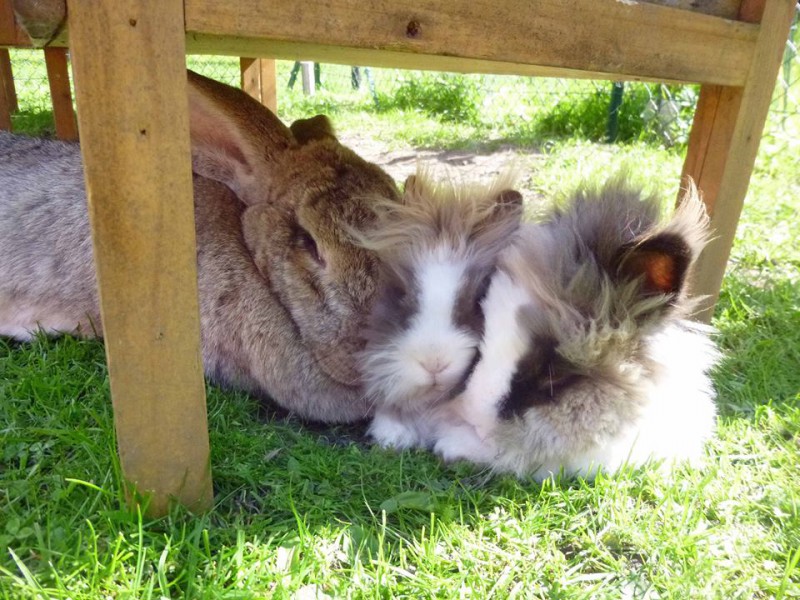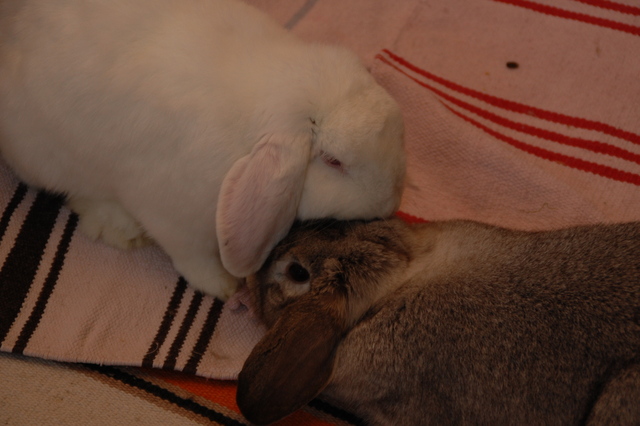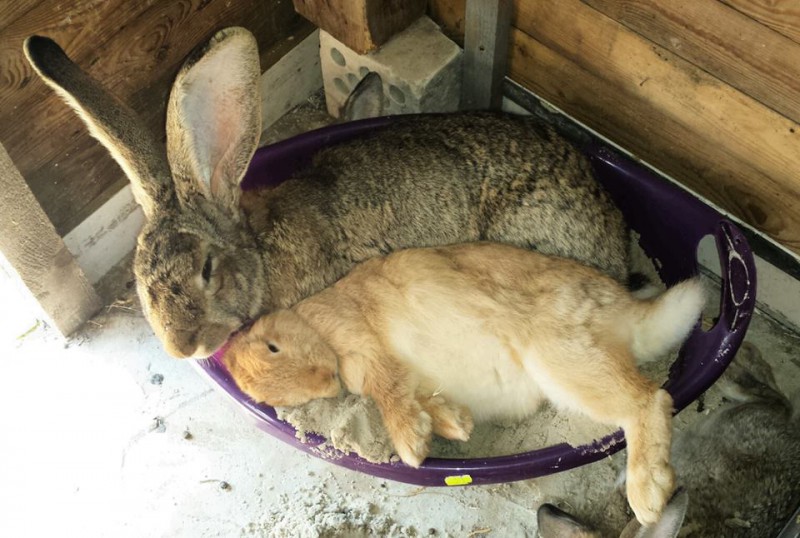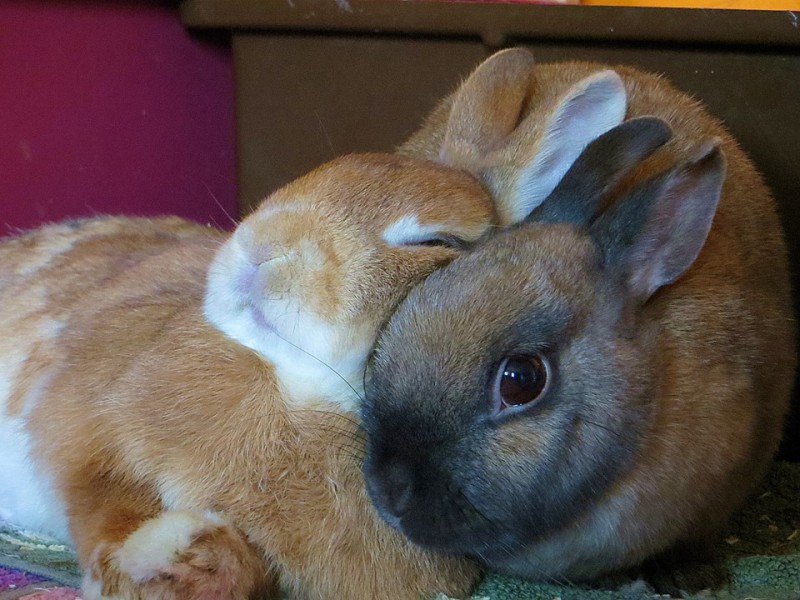
A recent study shows that around 4% of all domesticated rabbits in Germany are kept alone (Exopet-Study 2017). In many countries of the world, very many rabbits are kept alone, often it is even the most common form of husbandry. Let’s break this down and see whether this is appropriate or not.
Contents
Can my rabbit live alone?
- Are you available 24/7 for your rabbit until the day it dies?
- Do you groom your rabbit by licking its ears and eyes?
- Do you hop around with your rabbit and explore its environment?
- Do you lay next to your rabbit around 7 hours a day and cuddle (body contact)?
- Do you know how to speak rabbit and talk to it every day?
- Do you protect your rabbit by keeping an eye out for possible predators and stomp if needed so your rabbit can relax because it knows that you are guarding it?

If you answered all questions with “no” that means your rabbit needs another rabbit companion. Humans are not the appropriate replacement.
„Rabbits need at least one other rabbit for their comfort and for grooming each other but definitely not a guinea pig.“
Bundesverband Praktizierender Tierärzte e.V. (Federal Association of Practicing Veterinarians).
Please note

Even if you actively dedicate 4 hours a day to take care of your rabbit, it will still be alone and lonely for the remaining 20 hours. This accumulates to around 600 lonely hours a month and 57.600 hours during its whole life. Appropriate care and lots of activity will not replace another rabbit. Therefore, consider getting at least a second rabbit to provide your rabbit the best life it deserves. Sidenote: Keeping rabbits alone is already prohibited in Austria and Switzerland. Germany is also currently working on new legal regulations. The animal welfare act (Germany) states that it is mandatory for social animals to be kept with other social animals of the same species in order for them to follow their social interaction instinct.
“Rabbits are sociable animals who naturally live in herds. This means keeping them alone is not appropriate. Many rabbit behaviors are directed towards family coexistence. Social relationships between group members result partly from innate behavior, partly from individual experiences and learning processes that only gradually mature into their behavioral.”
Birgit Drescher, Veterinarian
What scientific studies tell us about keeping rabbits alone

Rabbits living alone are less active than rabbits in a group. In addition, they eat out of boredom causing them to get obese. Extreme gnawing (and other behavioral abnormalities) was found in lonely rabbits in one study, but not when they were in rabbit pairs. Despite various hiding spots, the rabbits preferred to lie down next to their fellow mates.
Are there rabbits who cannot be bonded?
I have been presented a lot of seemingly antisocial rabbits. Up until now I was able to bond all of them with another suitable rabbit which made them live out their social instinct. Therefore I am concluding: Every single rabbit is able to live and thrive with another rabbit. Anyone who is still convinced that their rabbit is not bondable can gladly contact me and I will certainly bond them with another rabbit successfully.
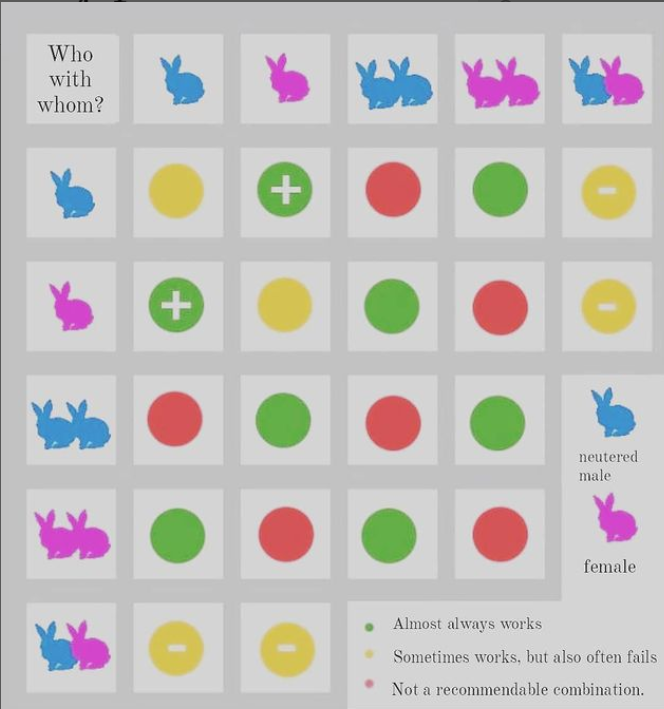
Rabbit owners often stop the bonding process too early because their rabbits start to fight. Fights and pulling each other’s fur is part of the bonding process because it is the only way they can determine their hierarchy. Additionally not all rabbits are compatible with each other. Sometimes you have to try to bond them with several different rabbits. Often though it will work instantly. More reasons for failed bonding can be either wrong combinations or a not appropriate way of keeping the rabbits and a not suitable place for the bonding process.
“My rabbit is happy alone!”
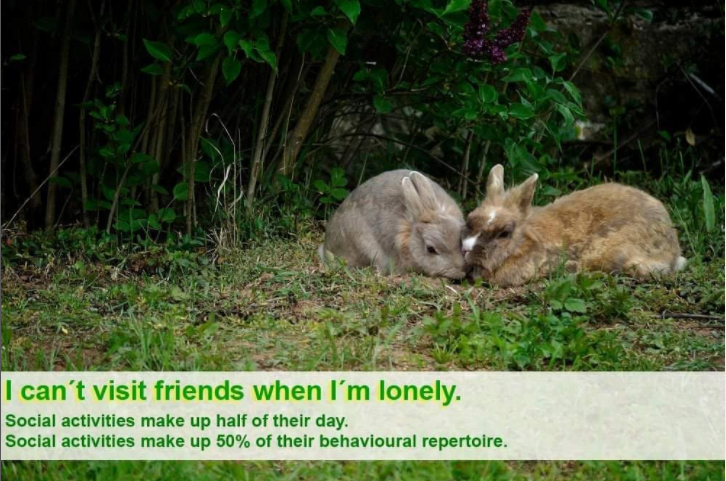
Rabbits are very social animals even though they hop around and “seem happy”, they are still missing a companion who can speak their language, cuddles with them, explores their environment together and will be there all the time. Keeping rabbits alone is already widely prohibited in Austria and Switzerland because it is torment for the animals.
Are rabbits tamer when they live alone?

The more anyone interacts and takes care of a rabbit the tamer it is going to get. Often times one rabbit can support another rabbit to get over its fear and anxiety to be more social. The reason that single rabbits are tamer is that their owner often takes more time to care for and play with them rather than if they would have had another rabbit companion.
“The most common problem with keeping rabbits is monotony and therefore boredom. As a result they often times develop behavioral disorders. To appropriately keep rabbits they need to have lots of variety and environmental stimuli. This usually applies to other animal species as well. Having contact to other rabbits is very important as their natural instinct is to live and survive in rabbit groups. Social behavior in part of their overall behavior accounts for up to 50% of their daily activity. Two or more rabbits that are similar of age and ideally have been freshly weaned off from their mother are perfect for pet keeping.“
Bundesverband Praktizierender Tierärzte e.V. (Federal Association of Practicing Veterinarians)
My rabbit has a guinea pig as a companion!

Unfortunately, it is still common that pet stores recommend guinea pigs and rabbits to live together to “prevent” loneliness. The reality is though that both species will be „together alone” as they are just not compatible. More information can be found in our article (Guinea pigs and rabbits).
Anyone who keeps their rabbit alone won’t know how they can thrive by letting them live with another rabbit. … Recommendation: www.nie-allein.de
Laws for keeping rabbits alone

In many countries of the world it is already forbidden by law to keep a rabbit alone.
Social animals in Switzerland
„Animals who have social instincts must have contact to other social animals of the same species.“
Tierschutzverordnung (TSchV) vom 23. April 2008 (Stand am 1. April 2011) (Animal Welfare Act, 23rd April, 2008)
Social animals in Austria
“It is the responsibility of anyone who keeps an animal to ensure that social contact opportunities are appropriate to their physiological and ethological needs, taking into account the species, age, and degree of development, adaptation, and domestication of the animals”
Bundesgesetz über den Schutz der Tiere (Tierschutzgesetz – TSchG)§ 13, Abs. 2, TschG (Federal law on the protection of animals § 13, paragraph 2)

Social animals in Germany
„Anyone who keeps and/or takes care of an animal,
1. must feed and care for the animal appropriately according to its species needs and accommodate it in a manner appropriate to its behavior.
2. must not restrict the animal’s ability to engage in species-appropriate exercises in such a way that causes pain, suffering or harm
3. must have the knowledge and skills required for the appropriate feeding, care and housing of the animal in accordance with its behaviour.”
Animal Welfare Act, version published on May 18, 2006

Social animals, like rabbits, need to live with other social animals of the same species This is also the verdict of the administrative court in Trier (AZ: 6 K 1531/13.TR), which had to decide whether the veterinary office may prescribe that a donkey owner must keep a second one. Yes, they can, because keeping them individually does not meet the requirements of the needs of the donkey (§2 Animal Welfare Act).
Therefore, keeping social animals alone is prohibited in the General Animal Welfare Act.

